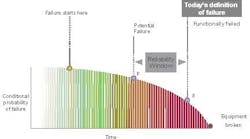The United States lost 40,000 manufacturing jobs in August. Plants are shutting down everyday. Companies struggle to find the nonexistent “silver bullet” for increasing reliability and equipment performance while reducing costs. Short-term and long-term solutions can increase reliability, asset availability, utilization, quality and capacity, but they’re not easy or simple. Look at the barriers that hold a plant back.
|
View related content on PlantServices.com |
First is the belief that a failure means the equipment is broken. That’s wrong. A true failure of an asset is when it no longer meets the function required of it at some known rate or standard. For example, if a conveyor that’s supposed to operate at 200 meters per minute can’t, it has failed functionally, thus affecting revenue.
Second, in many cases, when an asset fails, no one in maintenance seems to understand that it failed. Maintenance doesn’t get involved when quality or production rate issues arise.
Last, many maintenance departments don’t know the equipment’s performance targets and don’t understand why it’s important to know them. This isn’t a maintenance department failure. It’s a breakdown revealing misaligned goals.
Overcoming these barriers is essential to rapid reliability improvement. An understanding of and focus on functional failure by all plant personnel leads to rapid results. Focus on aligning the total plant on meeting each asset’s performance target. Post the targets and current rates to publicize performance gaps to both maintenance and operations. Both organizations must accept responsibility for eliminating the performance gap.
Achieving rapid breakthroughs requires you to define failures properly. A reactive company might say failure means the conveyor is broken or stopped because of mechanical problem. A proactive company says the conveyor no longer performs the function required. A partial functional failure occurs when it’s supposed to operate at 200 meters per minute, but can only run 160 meters per minute. A total functional failure indicates it stopped because of a mechanical problem (see figure).
Uncover your “hidden plant” that provides the gains you need. If your equipment operates below defined performance targets, establish a policy of immediately engaging the maintenance department. Focusing on equipment performance targets is the key to rapid asset reliability gains.
The old saying, “It’s what you don’t know that kills you,” is applicable to reliability issues. Getting to the rapid breakthroughs in plant performance is just the beginning of a long journey. Don’t be satisfied with the reliability results you gain by following my advice. Continue onward by applying Reliability Centered Maintenance (RCM) methodology to zero in on “optimal reliability at optimal cost.” I didn’t say use RCM; I said RCM methodology, which could be RCM II, Streamlined RCM, FMEA or MTA. They’re different methodologies, so learn about them and how they can foster rapid performance gains.
Just remember, some people have made short-term, rapid performance gains. Most, however, have only sustained their performance. If you would like further information about rapid breakthroughs in performance, send me an e-mail. My final plea is that America should wake up before it’s too late.
